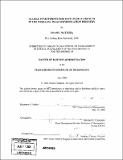| dc.contributor.advisor | Michael A. Cusumano. | en_US |
| dc.contributor.author | Matsuda, Osamu, M.B.A. Massachusetts Institute of Technology | en_US |
| dc.contributor.other | Sloan School of Management. | en_US |
| dc.date.accessioned | 2007-04-20T15:54:49Z | |
| dc.date.available | 2007-04-20T15:54:49Z | |
| dc.date.copyright | 2006 | en_US |
| dc.date.issued | 2006 | en_US |
| dc.identifier.uri | http://hdl.handle.net/1721.1/37233 | |
| dc.description | Thesis (M.B.A.)--Massachusetts Institute of Technology, Sloan School of Management, 2006. | en_US |
| dc.description | Includes bibliographical references (leaves 100-103). | en_US |
| dc.description.abstract | Since its establishment in 1992, NTT DoCoMo had accomplished rapid growth by developing innovative strategies and meeting consumer demands. However, the population-based penetration rate of Japanese wireless phones now exceeds 70%, and the market is approaching saturation. Tariff reduction battles have occurred among competitors since the introduction of flat rate packages in 2004. Furthermore, this competitive environment will become even more fierce with the introduction of Mobile Number Portability and the addition of new entrants It is difficult for Japanese wireless telecom operators to achieve sustainable growth if they continue to follow existing business models. DoCoMo therefore has begun to implement a new business platform, 'Mobile Wallet' on which DoCoMo aims to build an unprecedented business model-the fusion of its credit card and wireless phone businesses. DoCoMo still generates a high level of cash flow from its existing businesses, even though its growth rate has decelerated. In addition to the new strategy that has been implemented for the domestic market, I believe DoCoMo should reinvest its abundant investment resources effectively into markets with high growth potential in order to increase the company's corporate growth. | en_US |
| dc.description.abstract | (cont.) In the past, DoCoMo acquired a minority stake in several wireless telecom operators in developed countries for the purpose of expanding its W-CDMA and i-mode platforms (developed by DoCoMo) but not for pursuing returns on its investment. In contrast, Vodafone, DoCoMo's chief rival telecom operator, acquired a majority stake in several wireless telecom operators in order to expand the scope and scale of its business and to pursue synergy effects. DoCoMo's present basic strategy can be defined as a technology-driven policy, while Vodafone's basic strategy focuses on financial matters as a finance-driven policy. In this thesis, I analyze the global strategies of these two wireless telecom operators, comparing their respective technology-driven policy and finance-driven policy. I present a philosophy and methodology for a global investment strategy that will creates future sustainable growth for DoCoMo. Finally, I examine specific investment candidates who could bolster the implementation of the new strategy. | en_US |
| dc.description.statementofresponsibility | by Osamu Matsuda. | en_US |
| dc.format.extent | 103 leaves | en_US |
| dc.language.iso | eng | en_US |
| dc.publisher | Massachusetts Institute of Technology | en_US |
| dc.rights | M.I.T. theses are protected by copyright. They may be viewed from this source for any purpose, but reproduction or distribution in any format is prohibited without written permission. See provided URL for inquiries about permission. | en_US |
| dc.rights.uri | http://dspace.mit.edu/handle/1721.1/7582 | |
| dc.subject | Sloan School of Management. | en_US |
| dc.title | Global investments for sustainable growth in the wireless telecommunication industry | en_US |
| dc.type | Thesis | en_US |
| dc.description.degree | M.B.A. | en_US |
| dc.contributor.department | Sloan School of Management | |
| dc.identifier.oclc | 85822749 | en_US |
